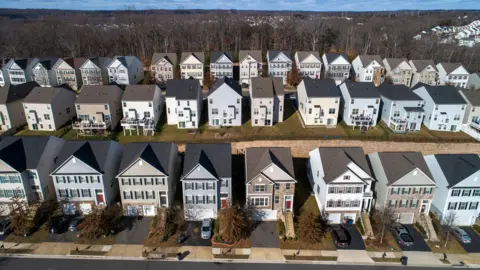Danielle KayeBusiness reporter

 EPA-EFE/REX/Shutterstock
EPA-EFE/REX/Shutterstock
A picture taken with a drone shows single-family homes in Woodbridge, Virginia, USA, 02 January 2024.
Aileen Barrameda is planning to buy a house in Los Angeles in the coming months. Stubbornly high mortgage rates - twice what she locked in at the start of the coronavirus pandemic - are not putting her off.
"If I have the means to get in the market, I might as well get in now, because homes are just going to get more expensive," Aileen said.
The cost of housing is a key concern among Americans and a political talking point. US President Donald Trump had raised hopes that interest rate cuts from the Fed would help Americans get mortgages.
The average rate on the 30-year mortgage, the most popular home loan in the US, fell to 6.35% last week, according to Freddie Mac. This marked the largest weekly decline in the past year and the lowest level in 11 months.
However, for buyers like Aileen, borrowing costs are not guaranteed to come down much more than they already have despite the Federal Reserve's interest rate cut on Wednesday.

 Aileen Barrameda
Aileen Barrameda
Aileen Barrameda, who is looking to buy a house in Los Angeles, stands on a residential street in the US city.
The Federal Reserve's interest rate decisions do not directly affect mortgage rates. But they do affect what banks charge each other to borrow money.
That then influences what banks charge their own customers for loans such as mortgages as well as the interest rate they pay on savings.
However, US banks had already cut mortgage rates in anticipation of the Fed rate cut that happened this week, meaning mortgage rates may not fall much further. Prospective home buyers waiting for substantially more easing might be disappointed.
Fed chair Jerome Powell, speaking to journalists on Wednesday, said as much.
"Most analysts think it would have to be pretty big change in rates to matter a lot for the housing sector," he said, while acknowledging that lower interest rates might boost demand and help builders.
Meanwhile, the risk of rising inflation could push mortgage rates up if banks anticipate this means the Fed will not cut rates any further any time soon. The Fed and other central banks tend to avoid cutting borrowing costs up if they feel inflation is too high.
"I do think that people are expecting a big impact from this," said Nicole Stewart, a real estate agent with Redfin in Boise, Idaho, referring to the Fed's rate cut this week.
"I've been trying to inform most of my buyers, as well as my sellers, that we've already seen the majority of what's going to happen."
Ms Stewart said a fall in mortgage rates over the past month has encouraged some buyers. Over the span of just one weekend earlier this month, Ms Stewart wrote four offers and put three deals under contract.
"A huge increase from anything in past few years", she said.
But the US housing market remains unaffordable for many people. That issue is unlikely to be resolved by future Fed decisions, or by the recent dip in mortgage rates.
Many homeowners secured unusually low mortgage rates - in the 3% range - at the height of the coronavirus pandemic, which they are hesitant to give up by selling their home. As such, homeowners who might otherwise downsize are choosing to stay put, reducing the amount of housing available for purchase and driving up home prices.
Roughly 80% of mortgage borrowers have locked in a rate below the current average of 6.35%, said Julia Fonseca, an associate finance professor at the University of Illinois Urbana-Champaign.
While every decline in mortgage rates helps loosen the market a little bit, there are no signs of substantial relief on the horizon, Ms Fonseca said.
"We might be still a long way from normalising these markets," she said.

 Kristin Carlson
Kristin Carlson
Kristin Carlson, a prospective first-time buyer in the Boise, Idaho area, stands on a residential street in Nampa, just outside of Boise.
Kristin Carlson, a prospective first-time buyer in the Boise area, has been scoping out the market for four years, while renting in the meantime.
For Kristin, easing mortgage rates in recent weeks means she is "just that much closer to pulling the trigger". She said she is eager to purchase soon, to get ahead of a possible scenario in which rates fall substantially further, spurring more competition.
Borrowing costs are factoring into Ms Carlson's thinking when it comes to the type of home that is feasible for her to purchase - the neighbourhood, the size, the quality of the builder.
Still, mortgage rates are taking a backseat to other considerations, including seasonality and finding a home that is the right fit for her needs.
Modestly lower mortgage rates are offering some relief and spurring activity among buyers, said Matt Vernon, the head of consumer lending at Bank of America. But bigger picture, the dip is not set to be enough to fix a housing market under strain.
"There's cautious optimism that we're headed in the right direction," Mr Vernon said.
"I don't think it's necessarily changed buyers' perception of the challenges in the market, but it's certainly got their attention."

 8 hours ago
1
8 hours ago
1










 English (US) ·
English (US) ·